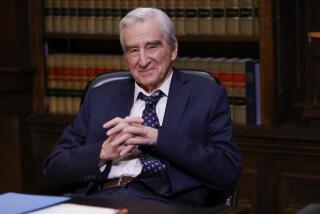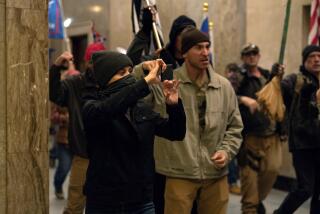‘Mad Men’ recap: ‘The beginning of something, not the end’
In the first three episodes of its final run, “Mad Men” has been in an almost defiantly slow, reflective mood. “You want action? Well, too bad. Here’s Don sitting in his office and looking at magazines.”
Along with the last-minute introduction of new characters including Richard and Diana, this has prompted grumbling in some corners, but astute viewers know that “Mad Men” always tends to follow a particular rhythm over the course of a season, starting off at a low simmer only to boil over suddenly as it closes in on a finale. In “Time & Life,” you can practically hear the hiss of the bubbles hitting the flame.
Focused in a self-conscious way on the show’s core ensemble, this episode ties the two strands of the show together seamlessly, using a major business development to spark intimate moments of catharsis and confession. Even the title works on both levels, as a reference to the building that has been the agency’s home since Season 4 and as a nod to the broad themes “Mad Men” has been revisiting in its home stretch.
Over the course of seven seasons of “Mad Men,” we’ve seen Don and the gang spring into action many times to save the agency, perhaps most memorably in “Shut the Door, Have a Seat.” But this latest bid for survival is different in that it prompts not only the usual round of frantic late-night scheming but also a great deal of soul-searching. Though Don devises a scheme to retain the agency’s autonomy, it’s too late. The writing is already on the wall, and McCann is handing Don, Roger, Joan, Ted and Pete “five of the most coveted jobs in advertising,” as Jim Hobart puts it, with the big-name clients to match; all they’re losing in the process is their agency. What’s the big deal?
When the partners gather to celebrate the news that evening, the mood is subdued rather than triumphant; even Roger, the office bon vivant, seems to be going through the motions. Though it’s difficult to feel truly sorry for any of them-- well, except for Joan, who has every reason to worry that she won’t be taken seriously at McCann -- it’s also easy to understand the sense of defeat. Yes, they’ll all still be rich, but the agency they spent a decade building is about to vanish with a couple of pen strokes.
Underscoring this sense of loss for Don is the fact that he is utterly alone. Diana has vanished into thin air, fleeing so quickly she even left her furniture behind (here’s a thought: maybe Don should buy it for his apartment?), and nearly everyone else has paired off. Ted, now divorced, has a rekindled romance with his college sweetheart; Joan has her Richard, her knight-in-a-shining-leisure-suit who hops on a red eye at the slightest sign she’s upset; and even Roger has crazy ol’ Marie Calvet.
Meredith has the unexpected honor of delivering this episode’s Line of Dialogue That Sums It All Up when she confronts Don about the McCann rumors: “In a month you’re not going to have an office and you’re not going to have an apartment.” (While we’re on the subject: Meredith really has become the dark horse of this season. Sure, she dresses like a third-grader and confuses the Manson family with the Manson brothers -- whoever they are -- but don’t you dare underestimate her. Nobody puts Meredith in a corner!)
Though everyone is sworn to secrecy, news of the agency’s effective demise travels fast and by the time that Don, urged by Meredith, gets around to making an official announcement, employees are on the brink of mutiny. “This is the beginning of something, not the end,” he tries to assure his team and, one has to assume, himself. No one even sticks around to hear what Roger has to say. It’s safe to say this is not going to be a smooth transition.
Like nearly everyone else at SC&P, Peggy is uncertain about her professional fate, and there’s a distinct sense that like Joan, she has more to lose with the agency’s demise because of her gender. (See also: Shirley and Dawn, who as black women probably have more to lose than anyone.) Peggy seeks the advice of a headhunter who, to her dismay, says she should go with McCann. The only catch is that this assumes McCann will want to hire a female creative executive, and that they’ll be willing to bring her in at the senior level she’s accustomed to. So far, McCann doesn’t exactly seem like a bastion of gender equality, but then again, neither did Sterling Cooper.
Peggy’s always been a sort of accidental trailblazer, someone who, as Elisabeth Moss told me, “just keeps bumping her head up against this glass ceiling, not even recognizing that it’s there.” But now it seems that fate is conspiring to turn Peggy into a card-carrying women’s libber. With her career hanging in the balance and circumstances at the office pointedly reminding her of the child she gave up for adoption, Peggy is moved to deliver what is easily her most overtly feminist speech in the history of the series.
“Maybe she was very young and followed her heart and got in trouble,” she says. Peggy is ostensibly speaking in defense of the obnoxious stage mom who leaves her daughter, “Susie Q.,” unattended at the SC&P office, but it’s obvious to us, and to Stan, that she’s really speaking about herself. “No one should have to make a mistake just like a man does and not be able to move on. She should be able to live the rest of her life just like a man does.”
Stan, whose bravado and facial hair can’t mask the fact that he’s a great big softie, reads between the lines and asks Peggy about what happened in her situation. She explains that “I’m here and he’s with a family somewhere. I don’t know, but it’s not because I don’t care. I don’t know because you’re not supposed to know, or you can’t go on with your life.” It’s a lovely moment between two characters who once loathed each other but have since formed a deep, lasting bond. If “Mad Men” were a romantic comedy, they would have paired off ages ago, but it’s not, so Peggy wipes away her tears and ends the confessional with a good-natured insult: “You don’t know lots of things about lots of people. That’s the point.”
So, yes, stuff finally happened this week on “Mad Men,” but somehow the episode was still in keeping with the contemplative, almost self-referential tone of the season, in which the fate of Don and the agency almost act as a commentary on the series as a whole. Fittingly, “Time & Life” is jammed with references to past episodes -- probably most obviously, the lineup of the five agency partners in the McCann conference room was a visual callback to the one of the series’ most iconic shots. Peggy’s conversation with Stan is also reminiscent of “The Suitcase,” another of “Mad Men’s” most celebrated installments.
Then there’s Don once again looking to the American West for salvation, like a pioneer seeking his fortune; he even refers to the gold rush in his aborted pitch to McCann. Don’s fixation with California has been a theme virtually since Day 1 on “Mad Men,” and his love for the place barely seems diminished, even though his failed marriage to Megan should be all the evidence he needs that it isn’t the land of romantic fantasy he once believed it to be. “I know you’re attached to California,” says Ted. “I don’t know what it means to you, but it doesn’t mean anything to me.”
And even moments that seem farcical, like Pete Campbell punching the daylights out of that snooty, ancient-grudge-carrying Greenwich headmaster -- feel like outtakes from a “Mad Men” highlight reel. This is at least the third time, by my count, that we’ve seen this most unlikely pugilist send his fists flying. Sadly, it’s also probably the last.
Stray thoughts:
-- By my count, this is the third time Pete’s decked someone on “Mad Men.” Other victims include Ken Cosgrove (“Basket of Kisses”) and that railroad conductor (“The Phantom”). Alas, Pete has been on the receiving end of a fist only once so far, when Lane Pryce punched his lights out in “Signal 30.”
-- Meredith is an example of one of the things that “Mad Men” has always done so well: a richly drawn supporting character who provides steady comic relief but then stuns us all with a bit of profundity. (See also: Miss Blankenship, Lois Sadler, Bob Benson.)
-- Another terrific supporting character I’m sad to see go is the perfectly awful Lou Avery, who smugly delivers the news that “Scout’s Honor” is being turned into a cartoon by Tatsunoko Productions, the makers of “Speed Racer.” I know asking for “Mad Men” spinoffs is a little bit of a cliche at this point, but Lou in Tokyo really, really is something I’d like to see. (Also, I never figured Lou for an anime fan.)
-- Peggy’s headhunter mentions that most agencies are strictly Ivy League and that, as someone who doesn’t even have a degree, her prospects are pretty good. It’s a reminder that as a working-class girl from Bay Ridge, Peggy’s a trailblazer for her class as well as her gender.
-- More perfect costuming courtesy of Janie Bryant: Stage Mom’s kitschy, berry-patterned red and white ensemble.
-- I didn’t realize it until she returned this week just how much I’d missed Trudy. Pete, you really screwed up on that one!
Follow @MeredithBlake on Twitter.
More to Read
The complete guide to home viewing
Get Screen Gab for everything about the TV shows and streaming movies everyone’s talking about.
You may occasionally receive promotional content from the Los Angeles Times.






